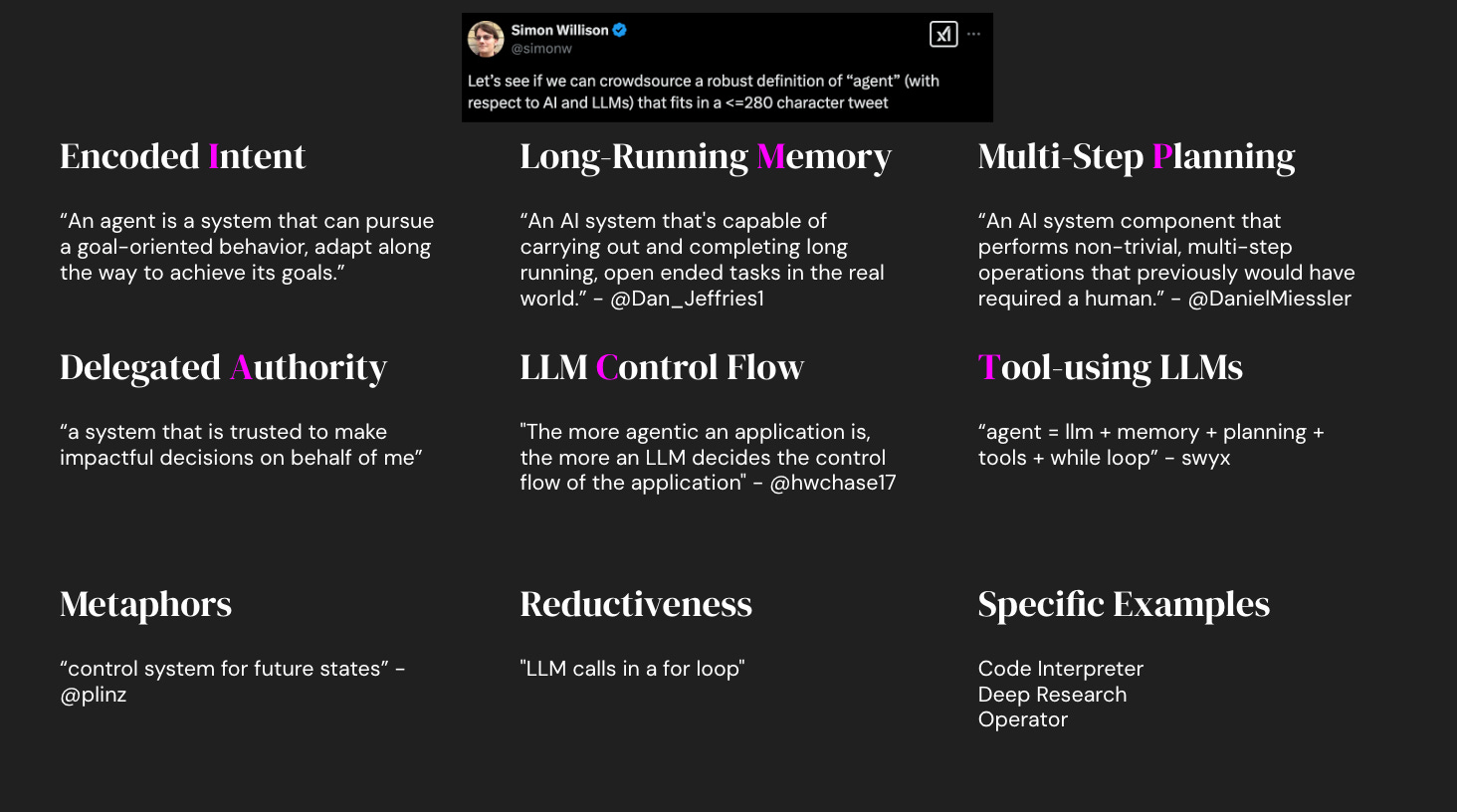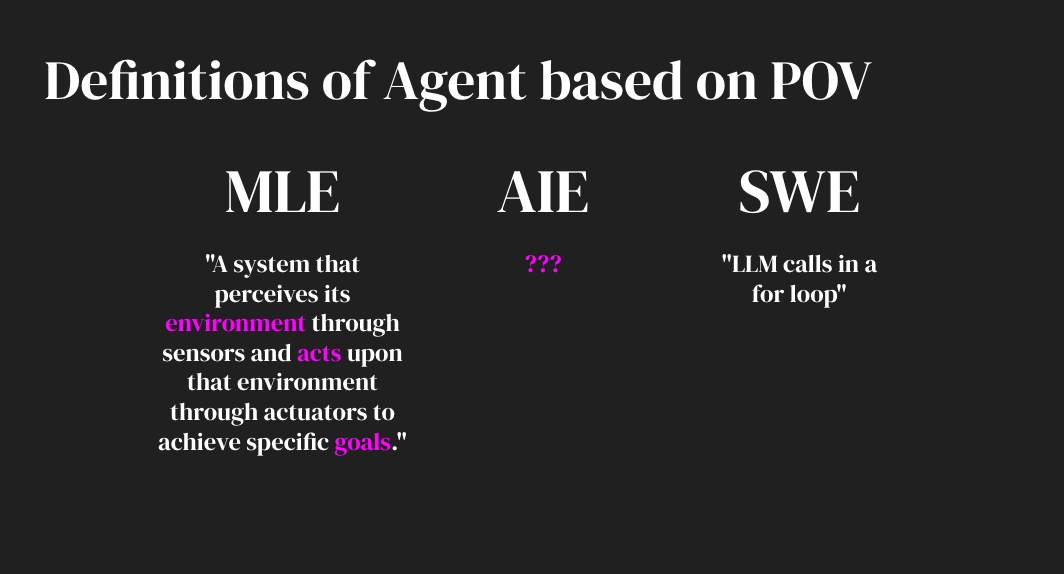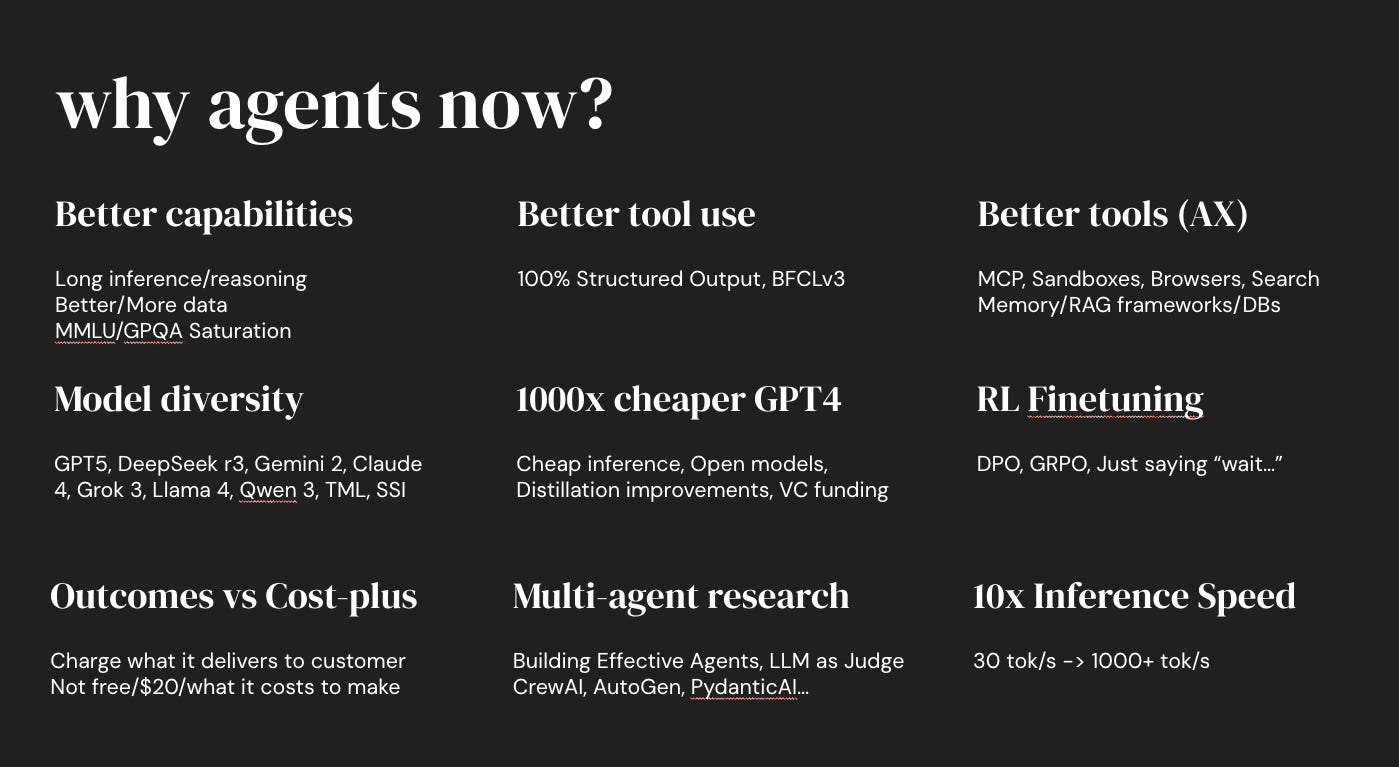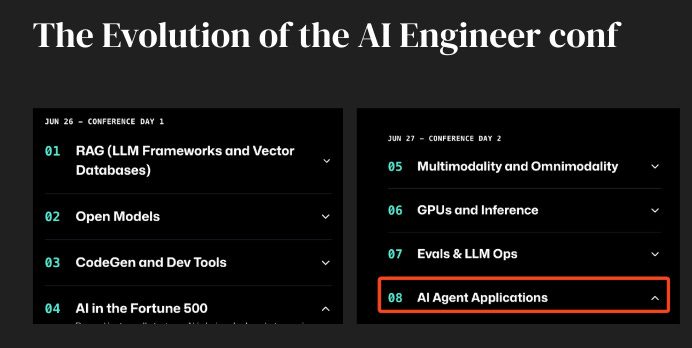This post contains elaborations on swyx’s 2025 AI Engineer Summit keynote, which also serves as a cohesive overview of a selection of Agents talks from the conference which link-clickers can preview. You can find the original video and slides here.
If you enjoyed our Claude Plays Pokemon Lightning pod, we are doubling down with a Claude Plays Pokemon hackathon with David from Anthropic! Sign up here.
When we first asked ourselves what we’d do differently from Summit 2023 and WF 2024, the answer was a clearer focus1 on practical2 examples and techniques. After some debate, we finally decided to take “agent engineering” head on.
First thing in discussing agent engineerings, we have to achieve the simple task of defining agents.
Defining Agents: A Linguistic Approach
Simon Willison, everyone’s favorite guest on LS and 2023 and 2024 AI Engineer keynoter, loves asking people on their agent definitions. It is an open secret that nobody agrees, and therefore debates about agent problems and frameworks are near-impossible since you can set the bar as low or as high as you want. Your choice of word is also strongly determined by your POV: Intentionally or not, people always overemphasize where they start from and trivialize every perspective that doesn’t.
In fact, even within OpenAI the definitions disagree — in day 1 of the conference OpenAI released a new working definition for the Agents SDK:
An agent is an Al application consisting of
a model equipped with
instructions that guide its behavior,
access to tools that extend its capabilities,
encapsulated in a runtime with a dynamic lifecycle.
We’ll acronymize this as “TRIM”, but note what it DOESN’T say compared to OpenAI’s own Lilian Weng (now co-founder of Thinking Machines with Mira Murati) in her post:
Agent = LLM + memory + planning skills + tool use
Everyone agrees on Models and Tools, but TRIM forgets planning and memory, and Lilian takes prompts and runtime orchestration for granted.
Achieving common understanding of a word is not a technical matter; but a linguistic one. And the most robust approach is descriptive, not prescriptive. Aka, achieving a fully spanning (maybe MECE) understanding of how every serious party defines the word. Simon has collected over 250 replies — so I did the last-mile of reading through all the groupings and applying human judgment…
The Six Elements of Agent Engineering
I’ve ranked them in rough descending order of commonality/importance:
LLMs with Tools: the thing everyone agrees on. Big 3 “LLM OS” tools are RAG (Contextual talk)/Search, Sandboxes/Canvas (OpenAI talk) and Browsers/CUA.
“Agent = LLM + memory + planning skills + tool use” — Lilian Weng
Encoded Intent: Intents come in via multimodal I/O (eg Voice talk), are encoded in Goals and verified via Evals (Snake Oil, Verifiers talk) run in Environments
“An agent is a system that can pursue a goal-oriented behavior, adapt along the way to achieve its goals.” - Chisom Rutherford
LLM-Driven Control Flow: as Anthropic’s Agents talk explain, LLMs-in-the-loop is a common line between preset “Workflows” and autonomous “Agents”.3
"The more agentic an application is, the more an LLM decides the control flow of the application" - Harrison Chase
Multi Step Planning: for which the SOTA is editable plans, as the Deep Research talk and Devin/Manus agents have shown are working well
“An AI system component that performs non-trivial, multi-step operations that previously would have required a human.” - Daniel Miessler
Long Running Memory: which create coherence and self-improvement loops. Beyond MemGPT/MCP memory, we also highlight Voyager, SteP style reusable workflows and skill libraries as a more structured form of memory.
“An AI system that's capable of carrying out and completing long running, open ended tasks in the real world” — Dan Jeffries
Delegated Authority: Trust is the most overlooked element and yet the oldest. “Stutter-step agents”4 get old fast. For read-heavy workflows you can Trust but Verify (Brightwave talk) but success in the enterprise needs more (Writer talk).
“An agent is trusted to act on behalf of and in the interest of those being represented. If there’s no trust there is no agent.” — Roman Pshichenko
When n > 3, acronyms can be helpful mnemonics, so we have selected the first letter to form IMPACT5.
You can FEEL when an agent forgets one of these 6 things. OpenAI’s TRIM agent framework has no emphasis on memory, planning, or auth, and while these can all be categorized as existing at the tool layer, they take on special roles and meaning in agent engineering and probably should have a lot more care put into them.
Agents, Hot and Cold
We’ve tried to accurately report the general “it’s so over”/”we are so back” duality of man in the AI Eng scene over the past years.
Spring 2023. In The Anatomy of Autonomy: Why Agents are the next AI Killer App after ChatGPT we tried to explain why the excitement of ChatGPT segued immediately into AutoGPT and BabyAGI (further explored with Itamar Friedman of Codium now Qodo).
Fall 2023 - Spring 2024. Then came the nadir of sentiment in Why AI Agents Don't Work (yet) with Kanjun of Imbue, with the first OpenAI Dev Day launching custom GPTs to a flop and subsequent board crisis. The Winds of AI Winter lasted all the way til David Luan asked us why Agents had become a bad word in Silicon Valley:
Summer 2024. The rebound came as Crew AI and LlamaIndex’s Agentic RAG became the most viewed talks at World’s Fair, our podcast on Llama 3 also introduced the first discussion of Llama 4’s focus on agents, which Soumith teased in his talk.
Fall 2024. It was Strawberry season, and with OpenAI hiring the top Agents researchers and releasing 100% reliable structured output and o1 in the API, reasoning models reignited the agent discussion in a very big way….
… if you also forgot about Claude 3.5, released in June and updated in Nov, which doubled Anthropic’s market share by simply being the best coding model and the model powering many SOTA agents like Bolt, Lindy, and Windsurf (talk):
All of which led up to Winter-Spring 2025, when OpenAI shot back with its first Operator and Deep Research agents and we went All In on Agent Engineering for NYC.
In fact, you can track ChatGPT’s growth numbers closely to model releases (as I did) and it is clear that the reacceleration of ChatGPT is all due to reasoning/agent work:
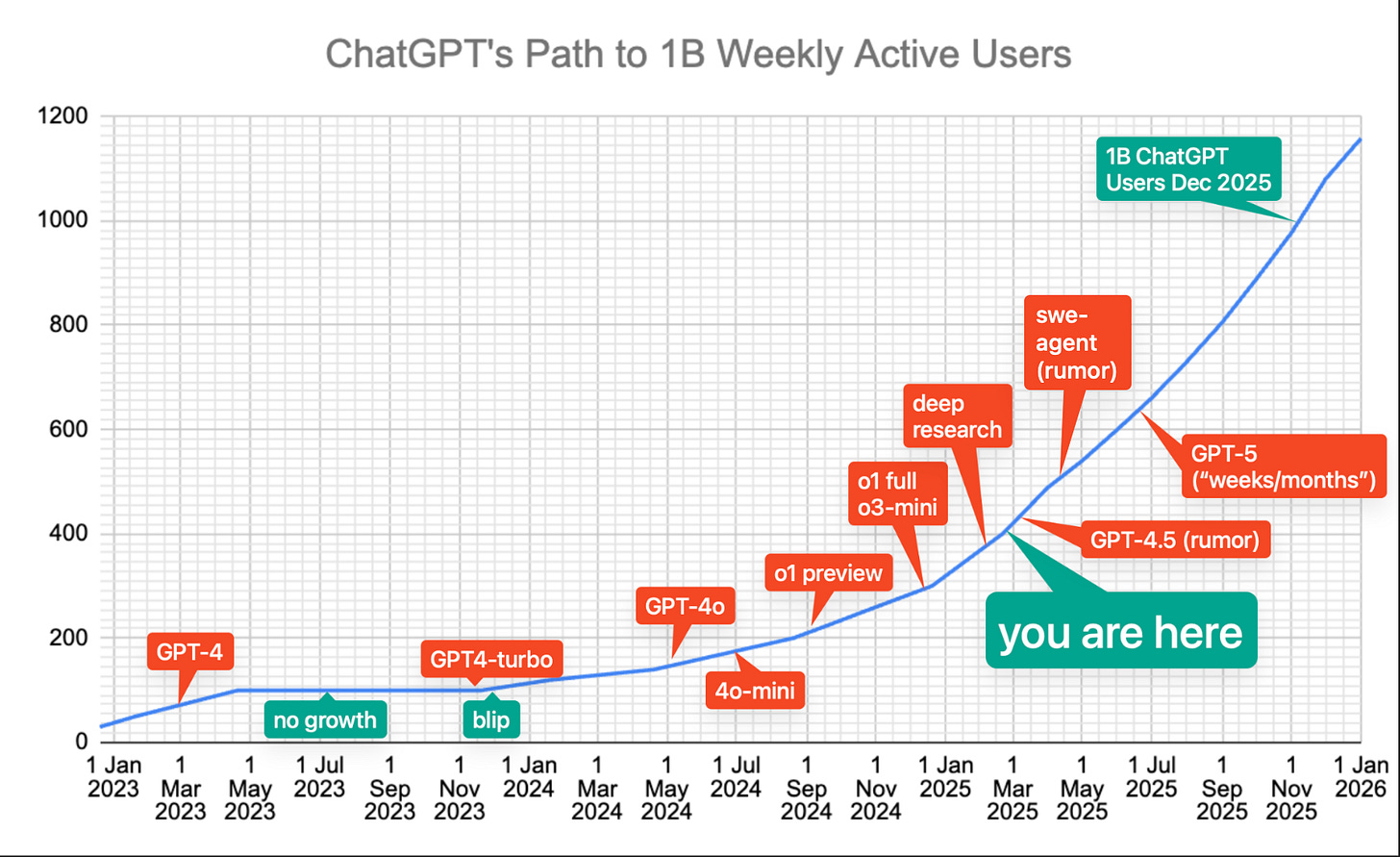
However, we think this chronology tracking model progress and general sentiment swings isn’t even a complete account of the agent resurgence, which is still on-trend for those paying attention to broad benchmarks.
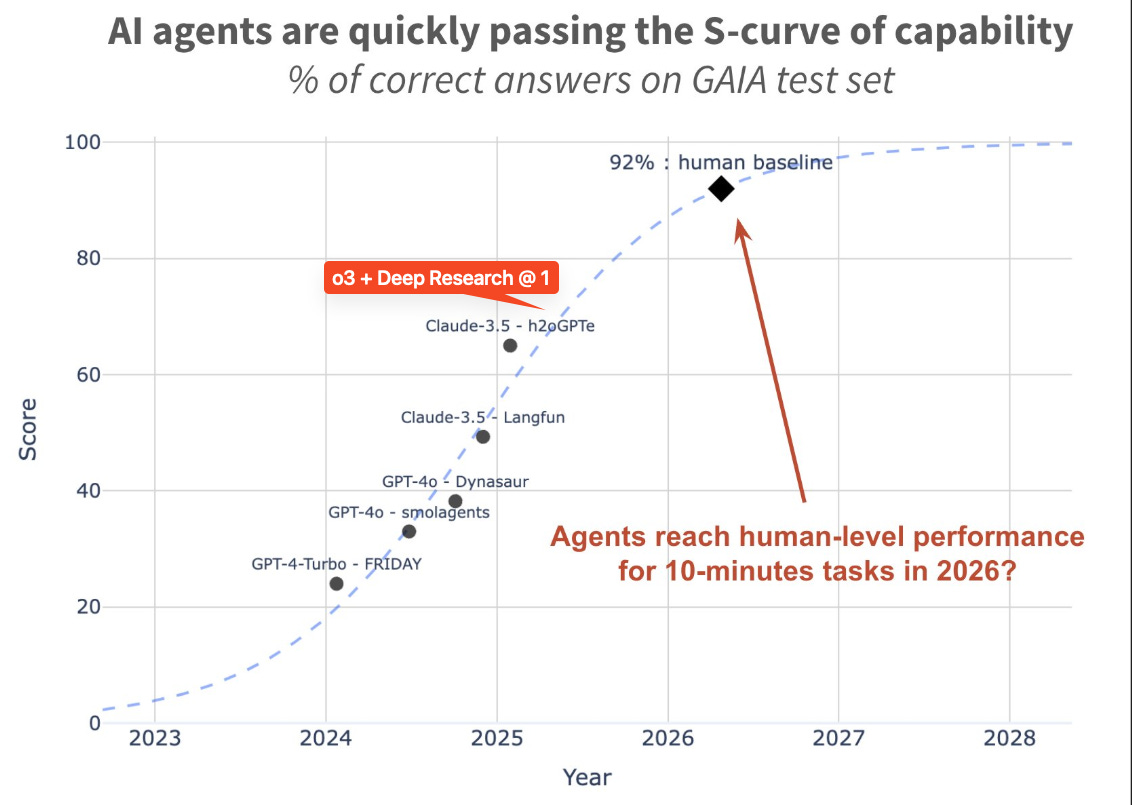
Why work on Agent Engineering Now?
Obvious Catalysts: the more dramatic stuff that is a must-know
Better Models: reasoning of course, also more coding, MMLU/GPQA
Better Tool Use: 100% structured output and BFCLv3/IFEval
Better Tools: improvements in the Big 3 tools and MCP winning the long tail
Slow-burn Trends: broader arcs that drive order-of-magnitude updates
Business Model Shifts: $2-20k ChatGPT and Sierra charging for outcomes
1000x Moore’s Law: Reasoning models are following GPT4’s cost drop curve
>100x inference: Speculative Editing & ASICs leading us to 5000 tok/s
Model Diversity: multiple labs taking share, including xAI/TML, enabling…
Multi-agent Research: from OpenAI’s to Pydantic to Crew AI is improving
RL Finetuning: Will Brown did a great talk on this, but we’ll have more soon.
This is why there’s a new resurgence in agents and the field of Agent Engineering is just now becoming the hottest thing in AI Engineering.
Full talk here
See me speed thru my slides on YouTube and leave a comment on what else you see!
No direct vendor pitches; a draconian rule inspired by dbt’s Coalesce conference. This feels harsh because of course some of the people most qualified to talk about a problem also sell a solution for it; this meant we had to actively solicit talks outside the CFP process from people who would not normally apply to speak, like Bloomberg and LinkedIn and Jane Street, and the only way for a vendor to get on our stage is to also bring a customer to talk about their real lived experiences, like Method Financial/OpenPipe and Pfizer/Neo4j and Booking.com/Sourcegraph.
Rahul’s (Ramp’s) talk also frames the choice as a form of Bitter Lesson - workflows get you far in the short term, but often get steamrolled by the next order of magnitude gain in intelligence or cost/intelligence.
Agents that ask for confirmation before every single external action - many real agents (like Windsurf) have had to figure out clever ways of exempting actions from human approval in order for the agent to have meaningful autonomy.
“write agents with IMPACT!” too hokey? I like it because M, P, A, C, and T came naturally already, so the only armtwisty one was “Intent”, because I didn’t want to limit it to OpenAI TRIM’s “Instructions” alone — the combination of Instructions and Evals felt better to guide agent behavior in the same way that the generator-verifier gap works at the model level.

